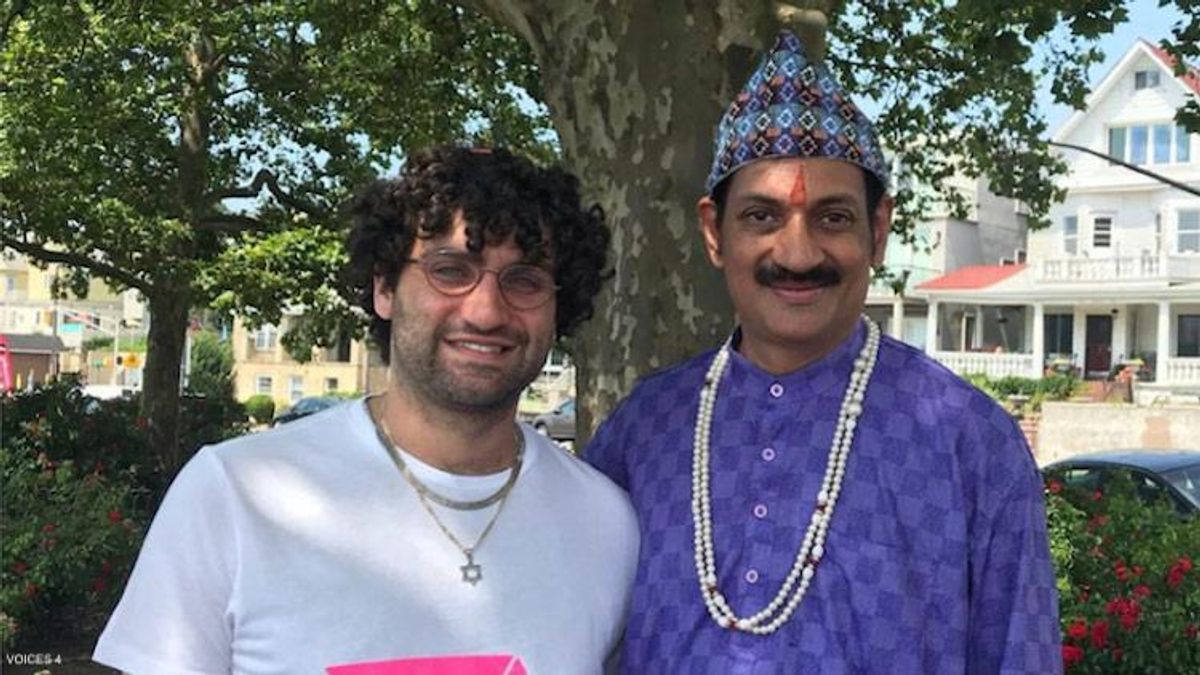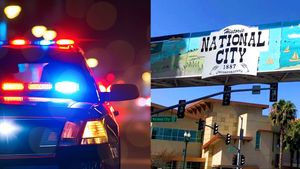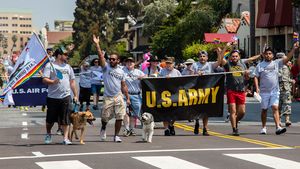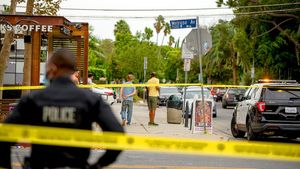I always knew that World Pride on the 50th anniversary of Stonewall was going to be a game changer. I am a New York-based queer community orgranizer who focuses on international issues, and I spent about two years planning for the event. My dream is to create what I call a "Global Queer Consciousness," the idea or attitude that an inherent part of being queer means showing up for other queer people. My mantra is "Queer People Anywhere are Responsible for Queer People Anywhere." It seemed to me that World Pride would be the perfect place to share and build on that message.
The reality was a little different. Within 12 hours of things kicking off, I found myself speaking to CNN, sporting a pink pompadour at a dinner with Lil' Kim, fighting with police in riot gear outside Stonewall, and cheering on my friend Marti, a drag queen who spoke at a rally directly after New York State Senator Kirsten Gillibrand.
Celebrity appearances, corporatization, and over-policing are a standard part of LGBTQ+ Pride in 2019, so none of that really shocked me.
I was surprised, however, to find myself in New Jersey the Saturday before World Pride interviewing Prince Manvendra Singh Gohil, India's only openly gay prince. We met in Weehawken Waterfront Park, a peaceful area directly off the Lincoln Tunnel with impressive views of Manhattan's West Side. He wore his customary attire: a loose collarless shirt (called a kurta) and a variety of stunning jewelry.
To me, the prince embodies the concept of Global Queer Consciousness. Almost exactly one year ago, India's Supreme Court struck down Section 377, the country's centuries-old colonial law banning homosexuality. The prince explained that things have gotten better for queer people in the year since its September 2018 repeal, saying the decision served to "encouraged more people to come out and live their lives freely" in a traditionally conservative country but cautioned that many challenges still lie ahead for LGBTQ+ Indians.
"People still face a lot of pressure from their families when they come out, being forced to marry, or thrown out of their homes," he told me in an hour-long conversation. "They often have nowhere to go, no means to support themselves."
The prince hopes to use his platform to help LGBTQ+ people who remain in need of assistance and aid. In 2018, the prince announced that he will be converting his palace and ancestral home into an LGBTQ+ center where vulnerable queer people can live, offering rooms, a medical facility and training in English and vocational skills to help people find jobs.
Amidst the mayhem, tragedy, and joy of celebrating Stonewall's legacy, we found a moment to talk about how queer people can show up for each other all across the world.
Note: This conversation was transcribed and edited by Antonio Perricone.
AE: It's a pleasure to be here with you. How has life changed for queer people in India since the repeal of Code 377?
PMSG: The repeal of 377 has definitely impacted the lives of gay men. The law was misused by the authorities. If the police found gay men cruising in parks, they would blackmail them, extort them, beat them up, and harass them. Now there is a feeling of security amongst the gay population. The fact is that homosexuality has been part of our culture. We have evidence for that in our scriptures, our temples, and our Kama Sutra.
The blame lies with the education system in India. We don't even teach sex education to our students. There's no teaching them about our history; colonization, sexuality, and homosexuality. A lot of people have this misunderstanding that (377) was an Indian law. And not many people know that it was, in fact, a colonial law.
Before the repeal, basic rights were being violated. We won this case on the basis of the fundamental rights which have been guaranteed to Indian citizens by our Constitution. It gives us these four basic rights: the right to equality, the right to privacy, the right not to be discriminated against, and the right to live in dignity and respect. All four rights were violated by Code 377.
Since there was no evidence to prove that Code 377 wasn't violating basic human rights, the religious leaders who were fighting against the LGBTQ+ community -- whether Hindu, Muslim, Catholic, Zoroastrian, Buddhist, Jain -- were defeated in the court of law. The Supreme Court of India ruled that the religious leaders and the citizens of India owe an apology to the LGBTQ+ community, for all the inhuman acts of violation they have faced since the time this law was enacted. It was a very important judgment.
What's your plan of action now?
Right now, it's important for me to educate people because it's only education which will bring people out of that sphere of ignorance. One of the things I'm doing is trying to create allies amongst all levels of society. Whether it's in political spheres, government, media, education, medical practitioners, or anyone in the general population. It is allies that will help us mainstream our issues in society.
In India, we've started something similar to PFLAG [a U.S.-based organization for families and allies of LGBTQ+ people] called Sweekaar. Sweekaar is an Indian word meaning "acceptance." Sweekaar were one of the petitioners to the Supreme Court when this case was being heard. We're allied with the Indian Psychiatric Association, which helped to rule that homosexuality is not a mental illness.
The media is an important ally; whether it's through television, print, radio, or podcast, we have worked to make them aware of these issues. I also reach out to educational institutions. I do a lot of lectures in colleges and universities and have designed a certified course dealing exclusively with LGBTQ+ issues. Students can be very good allies. They are the future of our country, the future of our society, and the future of our culture. So if at this age they are able to understand our issues and overcome their ignorance, then they could be better citizens, more informed citizens, and better parents than their parents would have been to them. That way we can bring about a lot of change. The next generation taking over our country will be much more informed citizens than their parents.
In America, there's a tension between the trans and gay communities largely due to the imbalance in the way effort and resources are allocated between them, even though trans people face a lot more discrimination. Is it the same in India?
So in India, what's interesting is that transgender people got their rights before countries like America even did. Way back in 2014, our Supreme Court passed the Rights of Transgender Persons Bill, which gave aimed to end discrimination against the transgender community; this includes trans F-to-M and M-to-F, as well as the hijras, a subculture seen only in India and the surrounding countries like Pakistan, Nepal, Sri Lanka, and Bangladesh.
The hijra culture has existed in India for a long time. It's mentioned in our holy scriptures, and they have been given the spiritual powers to bless others, often newly wed couples and newborn sons. They worship a goddess in India; her name is Goddess Bahuchara Mata. She's both a mainstream goddess and the patron saint of the Hijra. The Prime Minister of India is also a worshipper of this goddess. They form an important part of our culture. There's a paradox in that the Hijra are ridiculed and subject to stigma and discrimination.
We have historical evidence that the transgender community were very much responsible for the uprising and the revolt which happened against the British Empire in the 1800s. They were part of the army which revolted when we were being colonized, so the retaliation against them led to laws intended to suppress and disempower transgender people.
Even though our government was conservative at the time, they still realized the importance of giving the transgender community their rights as citizens of the country in 2014. Time and time again, the hijra population had been left off of the national census because they didn't list as either male or female. They didn't have passports, driver's licenses, bank accounts, or insurance policies. That's what makes it so important to recognize them as citizens of our country.
Another thing which the government is doing is trying to form transgender welfare boards in each state of India. My own state -- that's Gujarat State -- recently announced that they're going to form a transgender welfare board, too. It will ensure that transgender people get rights to education, to health, to housing, and all those things of which they have been deprived.
AE: The trans and the gender nonconforming community has been at the forefront of the queer liberation movement in America. They have been our leaders and our instigators. Would you say that trans people have also been at the forefront of the queer movement in India?
PMSG: Yes, members from transgender community have been at the forefront and have taken an active role in the leadership when it comes to fighting for their rights. And not just their own rights, but the rights of LGBTQ+ people generally. Even after transgender rights were given in 2014, they continued to fight until the repeal of Section 377 in 2018.
Recently there was a transgender marriage that was challenged, and the matter went to the Chennai High Court in South India. And the Court ruled that a transgender [person] has a right to get married. So now transgender marriage has also been accepted; whether you're a trans man, a trans woman, or a hijra, you have the right to get married. [As a] caveat, however, that's specifically if you identify as a Hindu. In India, marriage is based on your spiritual identity. So a person who identifies as Muslim or a Christian will not have the same ruling. Unless the government comes up with a civil code, it's all based on religious identity. There's a long way to go on that.
AE: Who are the most marginalized queer people in India?
PMSG: In India, the most marginalized would be those belonging to one of our many tribes and at the lower levels of the caste system. Even though it's a democratic republic and everyone has equal rights, there is still an issue with our caste system.
But more than anything, it's probably queer women who are most marginalized. After HIV/AIDS came to India, it galvanized the government into responding to gay and transgender groups, whereas lesbian and cis women's groups were left behind. The government gave funding to HIV/AIDS programs affecting the MSM population, rather than the queer population at large. It included gay men, bisexual men, even straight men who had sex with men circumstantially and situationally. Transgender people were put in a totally different category, but even within the category of transgender people, only trans M-to-F and hijras were included. So trans F-to-M were not given funding, nor were lesbian women.
If you are talking about financial empowerment, then women were absolutely kept out of it. Women have not been given a fair deal of justice. They are victims of a lot of domestic violence, sexual harassment, and marriage pressure. They don't have the independence that men, or queer men, are afforded.
AE: How can people in America, or people of the world, help queer people in India?
PMSG: Queer people in America can help people in India with advocacy and education. Create allies. Because anywhere in the world, talking from my own experience, wherever I've traveled, whichever part of the world, I have always been vocal about what I'm doing, the struggles I have gone through, and how I have come out of it. The more you talk about your struggles, your challenges, and what you have suffered in your life, the more you will get people involved in your story, and that's how you can bring about change. So if you are able to make a small difference, a small change in your part of your culture or the area which you live, it can go a long way to change a lot for other people.
AE: Lastly, what is Oprah like?
PMSG: Oprah is a genuine person, a person with a golden heart. She's a person who believes in connecting people, in filling cracks which have developed in any kind of relationship. She is a person who likes honesty.
I think the best compliment I have ever received from anyone so far in my life was from Oprah, when I was interviewed by her for the second time in 2011. She said to me that in the last 25 years, she's interviewed so many people, right from Nelson Mandela, to Dalai Lama, to Prince Charles, and the Obamas ... she gave a long list. She said, "You are the most honest person I've ever met." Nobody could have given a better compliment than that.
This interview has been edited and edited for clarity.
RELATED | First Openly Gay Prince Discusses Coming Out

























































































